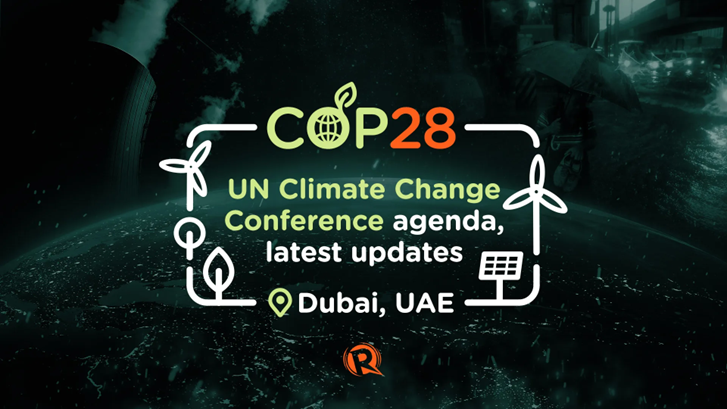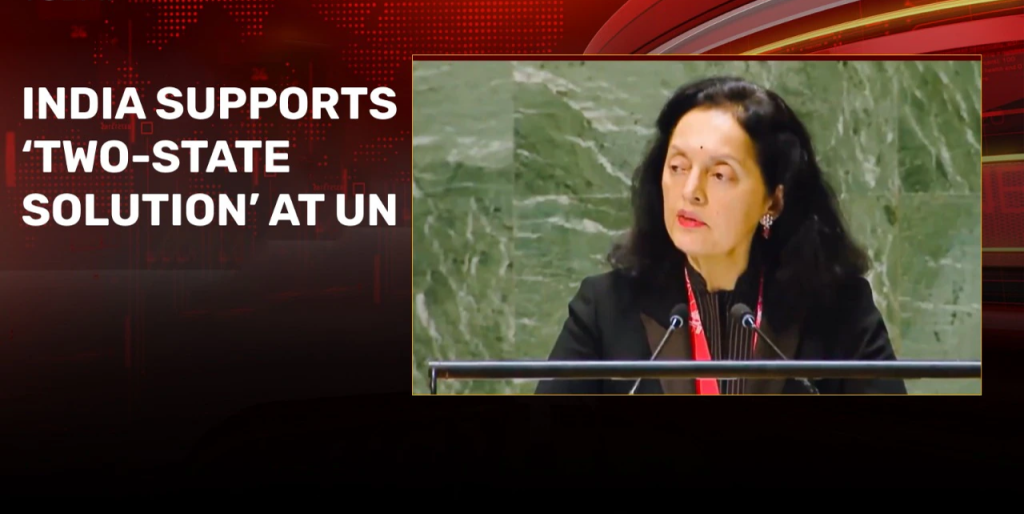Prime Minister Narendra Modi will attend the annual climate change conference, this time being held in Dubai from November 30. The 28th edition of the Conference of Parties to the UN Framework Convention on Climate Change (COP 28) will run till December 12. The main agenda is to complete a stocktaking exercise to review the progress in the global fight against climate change, and decide on measures to strengthen climate actions being taken by countries.
COP28 – What’s On The Agenda? Who’s Attending?
Why In News
- Prime Minister Narendra Modi will attend the annual climate change conference, this time being held in Dubai from November 30.
- The 28th edition of the Conference of Parties to the UN Framework Convention on Climate Change (COP 28) will run till December 12.
- The main agenda is to complete a stocktaking exercise to review the progress in the global fight against climate change, and decide on measures to strengthen climate actions being taken by countries.
- Modi will be in Dubai on November 30 and December 1. He will also hold bilateral meetings with some of the other leaders participating in the conference.
Conference Of The Parties
- COP is an international climate meeting organised annually by the United Nations (UN).
- COP is short for Conference of the Parties. ‘Parties’ is a reference to (now) 198 countries that have joined the international treaty called the UN Framework Convention on Climate Change (UNFCCC).
- ‘Parties’ to the treaty have pledged to take voluntary actions to prevent “dangerous anthropogenic [human-caused] interference with the climate system.”
Agenda Of Different Countries
- China leads the world in both clean and dirty energy, with more renewable energy capacity and more coal consumption than any other country.
- Responsible for about 30% of annual global emissions, China is the world’s biggest greenhouse gas emitter.
- The country is also suffering climate change impacts, including heatwaves and flooding, as well as extreme drought.
- In climate negotiations, Beijing argues that wealthy developed countries like the United States, the biggest historical CO2 emitter, should move first and fastest in climate policy and finance.
- United States – The world’s second-biggest emitter comes to COP28 a year into rolling out its $369 billion-plus subsidy package for electric vehicles and other green products.
- The Inflation Reduction Act (IRA) is expected to triple the country’s clean energy capacity by 2030.
- The U.S. and European Union are now asking others to join a COP28 pledge to triple renewable capacity this decade.
- The United States – the world’s biggest oil and gas producer – also supports a COP28 deal calling to phase out CO2-emitting fossil fuel use.
- But U.S. delegates will face pressure for climate finance after Washington pledged no new climate cash to the United Nations this year.
- The U.S. supports creating a new fund to help poor countries deal with climate-caused damage, but wants the deal to make clear no country will be obliged to pay into it.
- European Union – The 27-country EU’s negotiating position for COP28 is among the most ambitious. The bloc will push for tripling renewable capacity, phasing out CO2-emitting fossil fuels, ending new coal-fuelled power plants and powering electricity grids with renewable sources in the 2030s.
- The EU also wants countries to agree that technologies to “abate” – meaning capture – emissions will only be used sparingly. That sets up a clash between the EU and countries that are reliant on fossil fuels and see abatement technology as a way to prolong their use.
- At the U.N. climate talks, the EU bloc is traditionally allied with climate-vulnerable small island states. But the EU is at odds with those allies over some details of the climate damage fund.
- The EU wants China and other large economies to pay into the planned fund, which Beijing opposes.
- United Kingdom – Despite leaving the EU in 2020, the United Kingdom comes to COP with similar asks to the bloc – including on phasing out fossil fuels and tripling renewable energy.
- This year, however, London raised eyebrows among some climate diplomats by weakening some green policies and approving 27 licenses for oil and gas exploration. The UK government says it is still on track to meet its climate targets.
- ‘Basic’ Countries – Brazil, South Africa, India and China make up this bloc of populous, fast-developing countries.
- Each has asked for more climate financing and equity through the United Nations Framework Convention on Climate Change (UNFCCC) concept of “common but differentiated responsibilities” – meaning rich countries that emitted the most historically should do more to address the problem.
- India last year proposed widening a deal on phasing down coal to include oil and gas. It won backing from more than 80 countries, but Saudi Arabia and other oil and gas producers blocked it.
- Brazil has spearheaded negotiations on rules for carbon credit markets, through which it plans to monetise its vast forests.
- South Africa secured a 2021 deal for $8.5 billion from the EU, United States and other nations to help its shift from coal to renewable energy. But the country now is facing its worst power crisis, with rolling blackouts and ageing coal plants frequently breaking down.
- G77 + CHINA – This alliance of 77 developing countries and China also holds that rich countries have a bigger responsibility to cut CO2 than poorer nations. A key question this year is whether the G77 will stick together as smaller climate-vulnerable nations seek urgent climate action, while larger members like China are wary of rapid CO2 cuts.
- African Group Of Negotiators – African countries will be pushing at COP28 for climate finance and financial mechanisms to speed up green energy projects.
- Some African countries including Kenya, Ethiopia and Senegal have backed calls for phasing out fossil fuel production.
- But others like Mozambique want to develop their reserves of gas – both to boost their energy capacity and to capitalise on European gas demand. Any deal on phasing out fossil fuels, the group says, must allow poor nations to develop reserves in the short term to alleviate energy poverty.
- Alliance Of Small Island States The alliance, known by its acronym AOSIS, represents countries that are disproportionately vulnerable to climate effects including sea level rise. The group’s front-line experiences lend its members an influential position in COP talks, where its priorities include securing loss and damage finance and phasing out fossil fuel use to limit global warming to 1.5 Celsius – a threshold beyond which island nations face catastrophic climate impacts.
- High Ambition Coalition – Chaired by the Marshall Islands and including Vanuatu, Costa Rica, the United States and the European Union, this group pushes for more ambitious emissions targets and policies – among them, this year, halting new coal plants and peaking the world’s emissions before 2025.
- Least Developed Country Group – This group’s 46 nations are highly vulnerable to climate change but have contributed little to it. Aside from demanding that loss and damage be addressed, the LDCs want rich nations to double their financing for climate adaptation.
- India’s – During India’s recently concluded presidency of the G20, leaders agreed to pursue tripling renewable energy capacity globally by 2030 and accepted the need to phase-down unabated coal power, but stopped short of setting major climate goals.
- France, backed by the United States, plans to seek a halt to private financing for coal-based power plants during the U.N. climate conference.
- India is unlikely to favour such a plan and the proposal could further divide the group as major emerging nations like India still depend on coal to fuel its fast economic growth.
- About 73% of electricity consumed in India is produced using coal, even though the country has increased its non-fossil capacity to 44% of its total installed power generation capacity.
To crack the SSB Interview, You can join our SSB interview live classes batch and we recommend you to Enroll SSB INTERVIEW ONLINE COURSE. Trusted by thousands of defence aspirants.
- 20th ASEAN-India Summit & 18th East Asia Summit Highlights
- Manipur Police Register Criminal Case Against Assam Rifles
- Pakistan’s Ex-PM Imran Khan Jailed For 3 Years In ‘Toshakhana Case’
- Four Years After Removal Of Art 370: How Is The Actual Situation In Kashmir?
- Putin’s Critic Alexei Navalny Sentenced To 19 More Years In Prison
- Delhi Services Bill Tabled In Lok Sabha: Govt Of NCT Of Delhi (Amendment) Act, 2023
- Gurugram Nuh Violence: How A Religious Procession Turned Into A Communal Clash
- Govt Imposes Import Restrictions On Laptops, Tablets, Computers
- How Climate Change Is Altering The Colour Of The Oceans?
- New IPCC Assessment Cycle Begins: Why Is It So Significant?
- Difference Between NATO Vs Russia? [Explained]
- Italy Regrets Joining China Belt & Road Initiative (BRI)
- What Is Doping: Why Is It Banned In Sports?
- India Tiger Census 2023: India Is Now Home To 75% Of Tigers In The World
- Military Coup In Niger – President Detained, All Institutions Suspended
- No-Confidence Motion Against PM Modi’s Government
- Elon Musk’s SpaceX Rocket Punches Hole In Ionosphere
- Israeli Parliament Passes Controversial Law Stripping Supreme Court Of Power
- Significance Of 1999 Kargil War: How It Became A Major Game Changer For Indian Military?
- Controversy Over Movie Oppenheimer Gita Scene: How Are Films Certified In India?
- The Curious Case Of Qin Gang: China’s Foreign Minister Who Went Missing
- Twitter’s Iconic Blue Bird Logo Set To Be Replaced By An X Logo
- India Pulls Out Of Games In China Over Stapled Visas For Arunachal Athletes
- PM Modi Urges Sri Lanka President To Implement 13th Amendment
- India Pulls Out Of Games In China Over Stapled Visas For Arunachal Athletes
- Rajasthan CM Sacks Minister After Remarks Over Crimes Against Rajasthan Women
- Manipur Sexual Assault: Video Sparks Outrage Across The Country
- BRICS Summit 2023 In August: Why Putin Won’t Go To South Africa For The Summit?
- Robert Oppenheimer: The Father Of Atomic Bomb, Impact Of Bhagavad Gita On Him
- Russia-Ukraine Black Sea Grain Deal, Why Russia Has Halted It?
- Henley Passport Index 2023, India Passport Ranked 80th
- Indian Opposition Parties Form ‘INDIA’ Alliance, 26 Parties Unite For 2024
- Britain Joins Asia-Pacific Trade Group ‘CPTPP’ – Biggest Trade Deal Since UK Left EU
- NITI Aayog Report On National Multidimensional Poverty Index
- PM Modi UAE Visit: Highlights & Key Takeaways
- PM Modi’s Visit To France: Highlights & Key Takeaways
- NATO Summit Vilnius 2023: Highlights & Key Takeaways
- Turkey Supports Sweden’s Bid For NATO Membership At Vilnius Summit 2023
- Why ISRO Wants To Explore The Moon’s South Pole: Chandrayaan-3 Mission
- Bengal’s Panchayat Polls Turned Violent: SSB Interview Topic 2023
- First Ever IIT Campus Outside India In Tanzania
- RBI’s Report On “Internationalisation Of Rupee” Why And What Are The Benefits?
- Japan To Release Nuclear Wastewater Into Ocean – Gets Approval From IAEA
- PM Modi Chairs 23rd SCO Summit: Highlights & Key Takeaways
- Israel Raids Jenin Camp: Massive Military Operation In West Bank
- Dutch King Apologizes For Netherlands’ Role In Slavery: A Look At The Dutch Role In History
- Constitutional Crisis In Tamil Nadu: The Tussle Between Governor & DMK Government
- Why Has France Been Engulfed By Protests Again?
- Paris Summit – World Leaders Unite For A New Global Financing Pact
- India Ranked 67th On Energy Transition Index – Sweden On Top Of List By World Economic Forum
- Four Minor Planets Named After Indian Scientists
- NASA Recovers 98% Water From Urine & Sweat On ISS: Breakthrough In Long Space Missions
- ESA Space Telescope Euclid Is All Set For Launch To Observe Dark Side Of Universe
- PM Modi’s Trip To USA: Key Takeaways & Highlights
- PM Modi-Led Yoga Session Creates A New Guinness World Record
- Sajid Mir, The Mastermind Behind 26/11 – His Designation As Global Terrorist Blocked By China
- UN Adopts First Historic ‘High Seas Treaty’ To Protect Marine Life
- International Yoga Day 2023 – How It Was Celebrated Across The World?
- Gender Apartheid – Why Is Afghanistan At Stand Off With UN?
- Gandhi Peace Prize 2021 For Gita Press Why It Triggered A Congress-BJP Brawl?
- The New Pride Flag – Why The Change & What The Colours Signify?
- 48 Years Of Emergency – PM Modi Refers It As India’s Darkest Period In Mann Ki Baat
- Groundwater Extraction Has Tilted Earth’s Spin – How Will It Impact The Climate Change?
- Europe’s Worst Migrant Boat Disaster – 78 Dead, Hundreds Missing Off Greek Coast
- MOVEit Global Hacking Attack – Government Agencies In The USA Targeted
- Karnataka Govt Decides To Repeal Anti-Conversion Law: Why Was The Law Controversial?
- IIT Bombay Among Top 150 Varsities In QS Rankings 2024
- China’s Xi Jinping Backs ‘Just Cause’ Of Palestinian Statehood – Chinese Middle Eastern Diplomacy
- Turkey Won’t Back Sweden’s Bid To Join NATO – Why Is Erdogan Against Sweden’s Application
- UN Report Reveals Chronic Bias Against Women – 25% Of Population Thinks Beating Wife Justifiable
- Zinnai – Space Flower Grown On International Space Station By NASA – Why Is It Significant?
- Who Are Meira Paibis: Manipur’s ‘Torch-Bearing’ Women Activists?
- USA Set To Re-Join UN Cultural Agency UNESCO
- CoWIN Data Leak – Aadhaar, PAN Card Info, On Covid Portal, Made Public By Telegram
- $10bn Investment Deals Signed At Arab-China Summit – Is Arab World Moving Towards China?
- Cyclone Biparjoy Turns Into Extremely Severe Cyclonic Storm – 10 Points To Know
- PM Modi’s Trip To Egypt: Highlights & Key Takeaways
- El Nino Returns After 7 Years: Will Impact Second Half Of Monsoon
- Europe’s Copernicus Programme Completes 25 Years: SSB Interview Topic
- Trump Charged Over Secret Documents In A First For An Ex-US President
- 39 Years Since Operation Bluestar: What Actually Happened?
- Wagner Chief Vows To Topple Russian Military Leaders
- Arctic Could Be Ice-Free In The Summer By 2030: SSB Interview Topic
- PM Modi’s School In Gujarat Will Host Students From Across India
- Major Dam Collapse In Ukraine – Accuses Russia Of Blowing Up Kakhovka Dam
- Microsoft To Pay $20 Million For Illegally Collecting Children’s Info
- NIRF Ranking 2023: IIT Madras Tops The List For 5th Consecutive Year
- TRAI’s ‘Digital Consent Acquisition’ (DCA) Facility’- Unified Platform For Customers’ Consent
- 34th Anniversary Of Tiananmen Square Protest – Hong Kong Police Detains Activists
- Asia Security Summit 2023 Shangri-La Dialogue Begins Amid China-US Tensions
- Coromandel Express Accident – How 3 Trains Derailed, Crashed At Same Place In Odisha
- Law Commission Against Scrapping Of Sedition Law, Says It Will Protect India’s Unity
- Radical Changes In NCERT Textbooks – Poverty, Inequality, Democracy Among Topics Removed
- India GDP Data Beats Expectations – Stays Fastest Growing Economy
- Maharashtra’s Ahmednagar To Be Renamed Ahilyanagar
- Scientists Discover 2nd Moon Near Earth Orbiting Since 100 BC
- Erdogan’s Victory In Turkish Election – What Can Be The Impact On India?
- NASA Alert! GIANT Asteroid Racing Towards Earth
- Uganda Signs Anti-Gay Law With Death Penalty – Sparks Global Outrage
- RBI’s ‘Lightweight’ Payments System For Emergencies – An Alternative To UPI, NEFT, RTGS
- Significance Of ISRO’s Newly Launched NavIC Satellite In Regional Navigation
- What Is The Model Prisons Act – Reforms In The Indian Prisons System?
- Global Plastic Treaty – Negotiations Underway For A Plastic-Free Planet: SSB Interview Topic
- China Sends First Civilian Astronaut To Space As Shenzhou-16 Blasts Off
- US Congressional Panel Suggests Making India Part Of NATO Plus: SSB Interview Topic
- India Conducts National Cyber Defence Exercise
- What Is XPoSat, India’s First Polarimetry Mission?
- Germany Falls Into Recession As Inflation Hits Economy
- Bangladesh Faces Fuel Crisis – Dollar Shortage Issue
- Australian Universities Ban Student Applications From Certain Indian States
- What Is Volt Typhoon: China-Backed Hackers Targeting USA?
- Death Of Six Cheetahs At Kuno National Park: SSB Interview Topic 2023
- India-Australia Relations Get Stronger – What Is Migration Deal?
- What Is Sengol: To Be Placed In The New Parliament Building?
- Annual Misery Index – India Ranks 103 Out Of 157 Nations: SSB Interview Topic
- Russia Pressures India For Help To Avoid Getting Blacklisted By FATF
- What Is Mission LiFE – How It Will Fight Against Climate Change?
- What Is The ‘Pandemic Treaty’: How WHO Could Fight Future Pandemics?
- Assam CM Himanta Biswa Sarma Announces Withdrawal Of AFSPA
- El Nino Could Hit World Economy By $3 Trillion? SSB Interview Topic 2023
- Tussle Between Delhi Govt And Centre – Delhi Ordinance Issue: SSB Interview Topic
- China Braces For New Covid Wave With Up To 65 Million Weekly Cases
- Colour-Coded Warnings By The IMD: SSB Interview Topic 2023
- Saudi Scripts History As First Arab Woman Astronaut Lifts Off Into Space
- Controversy Behind Inauguration Of Parliament Building: SSB Interview GD Topic
- Uniform Civil Code: Is Time Ripe For the Indian Government To Act On It?
- Indian-Origin Ajay Banga To Be The Next World Bank President
- AI ‘Godfather’ Geoffrey Hinton Quits Google Warns Of Danger Ahead
- India Ranks 161 Out Of 180 Countries – World Press Freedom Index
- Supreme Court Rules It Can Directly Grant Divorce To Couples: SSB Interview GD Topic
- Kashmir All Set To Hold G20 Summit In India
- Go First Airlines Files For Insolvency: SSB GD Topic
- India Becomes Europe’s Largest Supplier Of Refined Fuels
- What Is The Met Gala – Fashion’s Biggest Night?
- Clashes In France Against Pension Reforms By Macron Govt
- Why Are Indian Wrestlers Protesting Against WFI Chief?
- China Offers Ukraine To Mediate To End War With Russia
- 50 Years Of Kesavananda Bharati Case: SSB Interview Lecturette Topic
- Assam-Arunachal Pradesh Border Dispute: SSB Interview Lecturette Topic 2023
- Same-Sex Marriages In India: Key Supreme Court Verdicts On LGBTQ Rights
- What Is China Plus One? SSB Interview Lecturette Topic 2023
- India-Maldives Relations: SSB Interview Lecturette Topic 2023
- India-Bangladesh Relations: SSB Interview Lecturette Topic 2023
- India-Japan Relation: SSB Interview Lecturette Topic 2023
- Geopolitical Importance Of The Indian Ocean: SSB Interview Lecturette Topic 2023
- All About Paris Club: SSB Interview Lecturette Topic
- PM Narendra Modi Has Been Named The Most Popular Leader In The World
- Hindenburg Report On Adani – Here’s What You Need To Know
- India At WEF Davos Summit 2023: Here Are 10 Key Highlights
- Pakistan Economic Crisis 2023: SSB Interview Topic [Fully Explained]
- Joshimath Crisis: What Does “Land Subsidence” Mean, And Why Does It Happen?
- Top 10 Animal Conservation Projects In India [MUST WATCH]
- What Is Shanghai Cooperation Organisation (SCO) Summit 2022? [Fully Explained]
- 20 SSB Interview Questions On Russia Ukraine Crisis
- What Is The (India-Israel-UAE-USA) I2U2 Summit? [Fully Explained]
- What Is International North-South Transport Corridor (INSTC)?
- What Is Sri Lankan Crisis? [Fully Explained]
- What Is The BIMSTEC Grouping And How Is It Significant? [EXPLAINED]
- What Is The Places Of Worship (Special Provisions) Act, 1991? [Explained]
- What Is Bodo Accord | SSB Interview Notes [Fully Explained]
- What Is AFSPA: Armed Forces (Special Powers) Act?
- What Is G20 Or Group Of Twenty Countries?
- What Is AFSPA: Armed Forces (Special Powers) Act?
- What Is The Financial Action Task Force (FATF)? [Fully Explained]
- What Is Quadrilateral Security Dialogue (QUAD)?
- Difference Between NATO Vs Russia [Expained]
- What Is United Nations Security Council (UNSC) [Explained]
- Everything You Need To Know About SAARC: South Asian Association For Regional Cooperation
- All About Russia Ukraine War: SSB Interview Topic [Fully Explained]


























